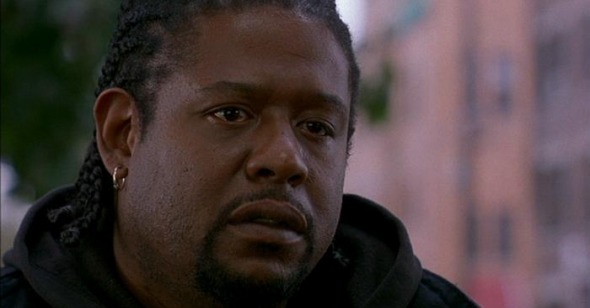Cold Warrior
Jeannette Catsoulis on Ghost Dog:The Way of the Samurai
Early in Ghost Dog:The Way of the Samurai, Forest Whitaker’s titular protagonist is walking purposefully along a dark, deserted street. Two men emerge randomly from different doorways and cross his path from left to right. Ghost Dog ignores them, and his stride never falters; but the physical choreography of those four seconds of screen time—so fluid we barely notice—are a perfect example of the painstaking focus Jim Jarmusch brings to even the most seemingly inconsequential moments. Like Altman and Scorsese, Jarmusch maneuvers his actors around one another with a precision that’s as casually symmetrical as the music they move to. He has a profound sense of rhythm.
This is also evident in the pungent, often absurdist dialogue he gifts equally to the men and women in his films and for which he is rightly celebrated. Less often, though, is he praised for his visual flair, for the images of urban desolation his characters understand and embrace. I used to think a Jarmusch film should always be in black-and-white, but Ghost Dog convinced me his particular brand of poignant heroism could still resonate in color. Whether tracking its hero on nighttime sidewalks or daytime rooftops, Robby Müller’s camera makes neon and sunlight as evocative, and as integral to the narrative, as the smoky New York streets of Stranger Than Paradise or the etched Louisiana landscapes of Down by Law.
Though cagey about its location—license plates announce only “The Industrial State” or “The Highway State”—much of Ghost Dog was shot in Jersey City, where the boarded-up storefronts and decomposing car lots frame a character as obsolete as his surroundings. Ghost Dog is a black assassin-philosopher working for the New Jersey Italian mob boss (John Tormey) who once saved his life. Practicing meditation and t’ai chi, Ghost Dog believes himself to be a samurai, a Japanese mind in an African-American body. But East and West collide when a local boss’s daughter (Tricia Vessey) witnesses Ghost Dog making a hit; no longer an anonymous killer, he has become a liability. With his own boss under contract to kill him, Ghost Dog must choose between the way of the samurai—which places honor above life—and survival.
Perhaps more than any other American filmmaker, Jim Jarmusch understands his country’s immigrant heart. What interests him is cultural collision, the racial friction and cross-pollination that reaches beyond black and white to the roots of a culture where everyone seems to espouse a hyphenate identity (so much so that the hyphen itself has mostly disappeared). In Ghost Dog, wiseguys rap deliriously along with Flavor Flav, while Ghost Dog’s friendship with a Haitian ice cream vendor (Isaach de Bankolé) is unhindered by the fact that neither speaks the other’s language. For a filmmaker so adroit with language, Jarmusch nevertheless understands that communication—through music, books, body language and facial expression—is a multi-sensory affair, more crucial in America than anywhere else.
More dreamy than energetic, Ghost Dog devises to parallel the tribal mores of the Mob with the code of a Japanese samurai. Ghost Dog doesn’t say much, but Jarmusch uses intertitles from Yamamoto Tsunetomo’s “Hagakure: The Book of the Samurai,” to reveal the clarity of his hero’s motivation. Driving to an assignment, he listens to a snippet of music informing us that “what goes around, comes around,” and sings along as though repeating a mantra. If Dead Man was Jarmusch’s first real engagement with mortality, he must have liked it, because the aura of death hangs over this film from the very first frame. Dead pigeons litter Ghost Dog’s rooftop; and when, on another roof, an unknown man is gunned down, the cemetery behind him is suddenly revealed. Even the face of the Mafia boss (the great Henry Silva) who issues a contract on Ghost Dog is lit to emphasize the skull beneath the skin. The Way of the Samurai, we are told, is the way of death, and for Ghost Dog there is no wiggle room.
All of Jarmusch’s films are sad in some way, and Ghost Dog’s poignancy leeches beyond the protagonist’s futile struggle. Subverting the usual flashy representations of Mafia life, Jarmusch gives us gangsters who are aging, depressed, and strapped for cash. Instead of mansions they inhabit cramped, ugly rooms, where they sit all day bickering and watching old cartoons on TV. (This Mob is redundant, not romanticized with Godfather gauze; even their Cadillacs extrude from garages too small to accommodate them.) The sorrowful tone is enforced by a soundtrack which fuses the hip-hop of RZA onto dreamlike images of urban decay, creating a hypnotic atmosphere of mournful dissonance. Nothing in this film feels solid or permanent.
Sweetening the melancholy is Forest Whitaker, in the single best performance of his career. Gentle and often a little clumsy, Whitaker has never enthralled me as an actor, his lazy left eye a frequent distraction from his performance. But here he has grace and presence, twirling his gun like an Eastwood archetype and gliding through a t’ai chi sequence with a lightness that belies his size. Whitaker makes Ghost Dog a touching and unlikely killer, a mystical force at once noble and foolish—a man so strange and unique he could only have been birthed by a country on the verge of cultural chaos.
